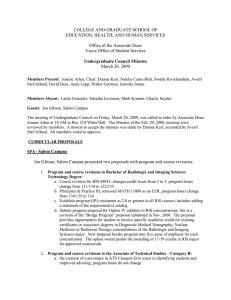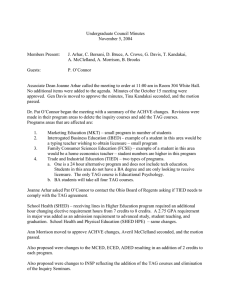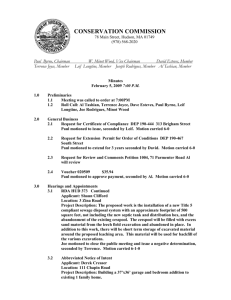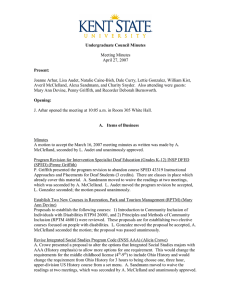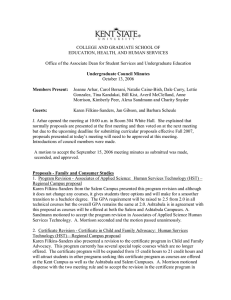Undergraduate Council Meeting May 6, 2005
advertisement
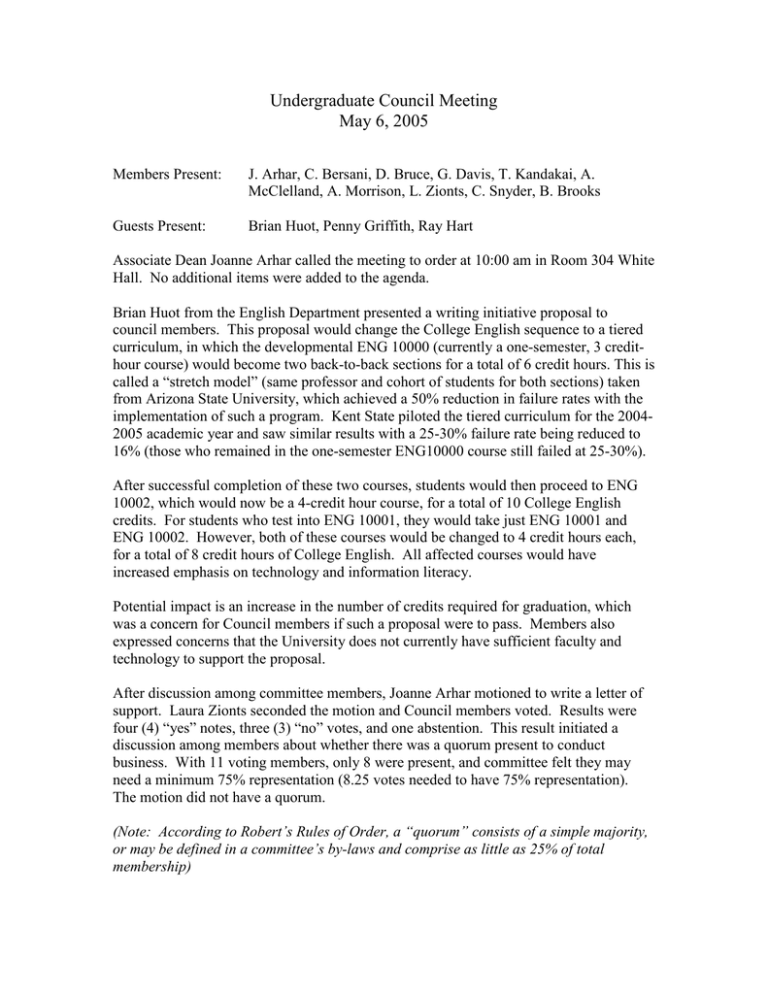
Undergraduate Council Meeting May 6, 2005 Members Present: J. Arhar, C. Bersani, D. Bruce, G. Davis, T. Kandakai, A. McClelland, A. Morrison, L. Zionts, C. Snyder, B. Brooks Guests Present: Brian Huot, Penny Griffith, Ray Hart Associate Dean Joanne Arhar called the meeting to order at 10:00 am in Room 304 White Hall. No additional items were added to the agenda. Brian Huot from the English Department presented a writing initiative proposal to council members. This proposal would change the College English sequence to a tiered curriculum, in which the developmental ENG 10000 (currently a one-semester, 3 credithour course) would become two back-to-back sections for a total of 6 credit hours. This is called a “stretch model” (same professor and cohort of students for both sections) taken from Arizona State University, which achieved a 50% reduction in failure rates with the implementation of such a program. Kent State piloted the tiered curriculum for the 20042005 academic year and saw similar results with a 25-30% failure rate being reduced to 16% (those who remained in the one-semester ENG10000 course still failed at 25-30%). After successful completion of these two courses, students would then proceed to ENG 10002, which would now be a 4-credit hour course, for a total of 10 College English credits. For students who test into ENG 10001, they would take just ENG 10001 and ENG 10002. However, both of these courses would be changed to 4 credit hours each, for a total of 8 credit hours of College English. All affected courses would have increased emphasis on technology and information literacy. Potential impact is an increase in the number of credits required for graduation, which was a concern for Council members if such a proposal were to pass. Members also expressed concerns that the University does not currently have sufficient faculty and technology to support the proposal. After discussion among committee members, Joanne Arhar motioned to write a letter of support. Laura Zionts seconded the motion and Council members voted. Results were four (4) “yes” notes, three (3) “no” votes, and one abstention. This result initiated a discussion among members about whether there was a quorum present to conduct business. With 11 voting members, only 8 were present, and committee felt they may need a minimum 75% representation (8.25 votes needed to have 75% representation). The motion did not have a quorum. (Note: According to Robert’s Rules of Order, a “quorum” consists of a simple majority, or may be defined in a committee’s by-laws and comprise as little as 25% of total membership) Minutes from April 1, 2005 meeting were reviewed. Averil McClelland moved to approve the minutes, Carol Bersani seconded, and the minutes were approved. Gen Davis discussed a proposal to revise the Middle Childhood Math Program Concentration requirements and options. Number of hours for graduation will not be changed. Averil McClellend motioned to accept the proposed changes, Andrew Gilbert seconded the motion, and all present voted to pass the proposal, pending votes from absent members. Penny Griffith discussed a proposed program change to the Deaf Education Intervention Specialist program to place it in line with all LER changes and TAG courses. This would entail changing text from “Select TWO of the following” to “Select ONE of the following” under Advanced Study Coursework. Anne Morrison motioned to approve the correction, Tina Kandakai seconded the motion, and all present voted to pass the proposal, pending votes from absent members. Course revisions for “Intervention Specialist: Gifted Education” were introduced by Penny Griffith. The proposal is to make changes to requirements that reflect changes to the MCED program. The Council decided to table discussion on this proposal until Fall 2005 because some information was incorrect. Penny Griffith explained a proposal regarding program revisions to INSP-EAA Educational Interpreter to include changes to LER options and a reduction in graduation requirements from 125 to 122 credit hours. Anne Morrison motioned to accept the changes, Averil McClelland seconded, and all present voted to pass the proposal, pending votes from absent members. The proposal previously discussed by the committee to revise the admissions policy for the College of Education was reviewed. After a short discussion, Averil McClelland motioned to accept the changes, but no one seconded the motion, so there was no vote. The EDPF course revisions were reviewed by the committee, in which the following four courses would be inactivated: EDPF 19525 Inquiry into the Profession, EDPF 39525 Inquiry into Schooling, EDPF 20091 Pre-Professional Seminar in Educational Studies, and EDPF 29510 School and Society. Averil McClelland pointed out that, because there may be an Educational Studies major, EDPF 20091 Pre-Professional Seminar in Educational Studies should not be inactivated. Anne Morrison motioned to approve the proposal with the exception of EDPF 20091, Laura Zionts seconded, and all present voted to pass the proposal with revision. Revision to the proposal will be made to reflect the change before it is submitted to EPC. Joanne Arhar introduced a revised Assessment of Teacher Candidate Dispositions proposal to the Council for review. If approved, the assessment instrument will be piloted in the 2005-2006 academic year to determine inter-rater reliability between university faculty and field supervisors. Ray Hart discussed the original Dispositions Assessment form, noting that the “Not Observed” category could mean two different things: 1) that the behavior was not seen in the student, or 2) that the assessor did not look for the behavior in the student. Therefore, this category was split into two separate categories, “Not Seen” and “Not Applicable,” for clarification. The Assessment of Teacher Candidate Dispositions will be administered as follows: 1) Educational Technology: Candidates electronically sign Statement on Student Professionalism acknowledging that they have read and understand the Statement. Students who transfer in and have already taken Educational Technology will be asked to sign this form when they go to a special session on the electronic portfolio. 2) Educational Psychology: During pilot year (2005-2006), both the Ed Psych faculty member and field-based supervisor will electronically complete the assessment instrument for each candidate. It is possible that not all of the items will be observed. 3) Advanced Study (prior to student teaching): Each program area will designate a field-based course during which the assessment instrument will be completed. It is possible that not all items will be observed. 4) Student Teaching: All items need to be observed in order for the student teacher to satisfactorily complete student teaching. An average score of 2.5 is required for a student to satisfactorily complete student teaching. A professional development plan will be developed with the candidate when a score of (2) is given on any item. The candidate will then have 4-5 weeks to show improvement before a Follow-Up Professional Development Plan in completed. The Follow-Up PDP needs to be completed with a faculty member in order for the student to be eligible for advanced standing, student teaching, and graduation. Tina Kandakai noted that week 12 is too late in the semester for the process to be successful. Rather, the assessment should be completed no later than the 10th week, preferably earlier. It was decided to postpone voting on this until Fall 2005. Meeting was adjourned at 11:35 am. NOTE: Joanne Arhar met with Alicia Crowe after the meeting and reviewed all pending proposals (Program Revisions for INSP-EAA Educational Interpreter, Program Revision Deaf Education Intervention Specialist, EDPF Course Inactivation, Program Change for MCED Mathematics Concentration). Dr. Crowe voted to pass the proposals, which provided the necessary majority. Hence these proposals were passed and will be forwarded to EPC for approval. NOTE: Following the meeting, information was added to the Intervention Specialist: Gifted Education proposal. The materials were redistributed, an electronic vote was taken, and the proposal passed.
